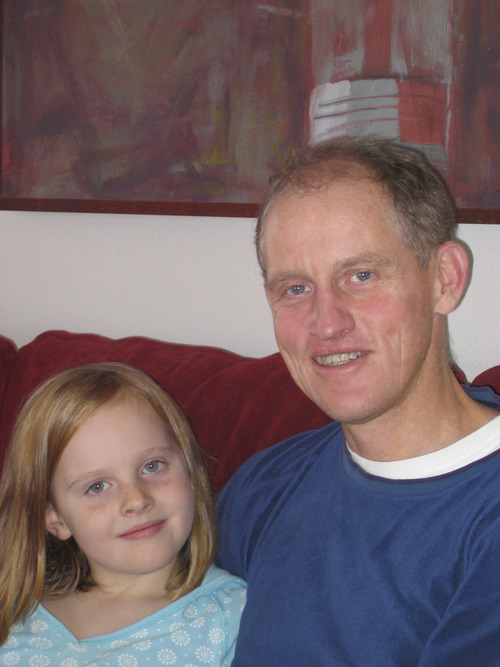This is an archived article that was published on sltrib.com in 2010, and information in the article may be outdated. It is provided only for personal research purposes and may not be reprinted.
Bill Barron doesn't mind that many people disagree with his view that climate change is a pressing problem that won't be solved until policymakers rise to meet the challenge.
He still sees lots of common ground in which people at odds with him still would be willing to work together for cleaner air, less dependence on fossil fuels, better national security, a lively economy and jobs that stick around. And he has discovered legislation — which he describes as a "no regrets" strategy — that addresses these concerns.
So this year the soft-spoken Sugar House carpenter and ski patroller launched a Utah chapter of the national Citizens Climate Lobby.
"Building relationships, creating communication, talking as adults," he said, "even if we disagree — it's going to be way more effective than the alternative" of bickering about carbon-dioxide emissions.
"The stakes," Barron said, "are so high."
Scientists have documented dozens of signs that greenhouse gases such as CO2 are disrupting global climate patterns. Many fear the changes will lead to more severe weather, water shortages and heat waves.
Barron has put his views to work by hosting monthly educational meetings and projects such as the Million Letter March, a campaign to persuade people to write political leaders to express their concerns about climate change and urge them to support legislation to address it.
The Utah group is one of 28 U.S. and Canadian chapters focused on a "fee-and-dividend" approach to controlling greenhouse gases rather than a cap-and-trade tack.
Setting a fee on carbon at the source — and distributing the revenues from it directly to Americans — would be more transparent and fair than cap-and-trade, advocates argue, and would give business more certainty about energy prices while spurring more renewable energy.
Sam Schmidt, a Salt Lake City resident who works in the financial industry, said he was drawn to both the means and the method behind the Citizens Climate Lobby.
"I see this as something that might work," he said.
Plus, the group focuses on a positive, courteous and fact-based approach. Shouting and put-downs have no place in their talking points.
Schmidt has joined Barron in lobbying meetings, including those with political leaders who opened by saying they doubt climate-change science. Nonetheless, Schmidt said, the meetings were productive. "They are listening more than people might think."
Mark Reynolds, the group's national executive director based in San Diego, noted that historically it has taken time for many key movements to take hold. And like ending slavery and securing the right to vote for women, it might take a while to persuade leaders to control greenhouse gases.
"We will carry the day," predicted Reynolds, who grew up in Salt Lake City's Avenues neighborhood and attended the University of Utah. "The alternative is unacceptable."
The Utah Farm Bureau Federation has been a vocal critic of congressional cap-and-trade legislation. And, while its executive director, Randy Parker, agrees with the climate lobby's premise that a direct tax would be more transparent and probably more equitable, he insists that putting a price on carbon emissions "will damage the American economy."
Still, Parker sees good in the Citizens Climate Lobby. For instance, he agreed that energy security, good jobs and cleaner air are issues that are equally interesting to his constituents.
Parker also pointed to the past election as an example of how effective citizen action can be in shaping government.
"Involvement, citizen involvement, is critical," he said. "That's what's made our country great."
Barron remains determined to gently challenge the antipathy of climate skeptics and the prevailing political apathy. He has a 7-year-old daughter, Emily, and doesn't want her or her children to be stuck with an environment wrecked by climate change.
"When I was a kid, we didn't even know about this," he said. "So now that we do know, how can I not pursue it with vigor? I want my daughter to experience [the natural world] I did."
About the carbon fee-and-dividend proposal:
What is a carbon fee? • A fee would be assessed on fossil fuels such as oil, gas and coal based on the tons of carbon dioxide they generate. It would start out low — $15 a ton — and gradually increase yearly.
How does it affect energy prices? • Not much. If the carbon fee started at $15 a ton, gasoline prices would jump 15 cents a gallon the first year and 10 to 15 cents each year afterward.
What is the dividend? • One hundred percent of the carbon fees collected would be divided and given back to consumers. This dividend would help people pay the increased costs associated with the carbon fee during the transition to a cleaner-energy economy.
From the Citizens Climate Lobby Web page —
More about the Citizens Climate Lobby
The group's next local event, The Earthanima Project, is set for 7 p.m. Dec. 9 in Salt Lake City's Main Library, 210 E. 400 South. More information about the touring art performance/film event is at earthanima.net. And more information about the Citizens Climate Lobby, including a video of the Million Letter March, can be found at citizensclimatelobby.org/.



